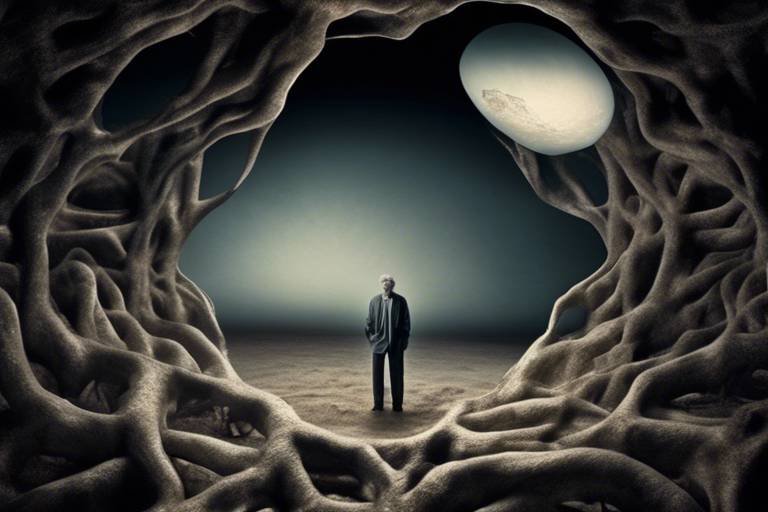Can Ontology Solve the Problem of Universals?
The question of whether ontology can effectively solve the problem of universals is both intriguing and complex. At its core, this philosophical debate revolves around understanding how properties or qualities—known as universals—are shared among different entities. Imagine walking into a room filled with various objects: a red apple, a blue sky, and a wooden table. Each of these items has distinct characteristics, yet they also share universal properties like "redness," "blueness," and "woodenness." So, how do we reconcile these shared traits with the individual objects that exhibit them? This is where ontology steps in, providing a framework for exploring the nature of existence and the relationships between entities and their properties.
Ontology, derived from the Greek words 'ontos' (being) and 'logos' (study), delves into questions about what it means to exist. By examining the essence of being, ontology seeks to clarify the status of universals. Are they real entities that exist independently of the objects that instantiate them, or are they merely names we use to describe shared characteristics? This fundamental inquiry shapes our understanding of reality and has significant implications for various fields, including metaphysics, science, and even linguistics.
To fully appreciate the potential of ontology in addressing the problem of universals, we must first understand the historical context of this debate. Philosophers throughout the ages have grappled with the nature of universals, and their differing perspectives have laid the groundwork for contemporary discussions. From Plato's abstract Forms to Aristotle's more grounded realism, the evolution of thought surrounding universals provides a rich tapestry of ideas that inform current ontological frameworks.
In the modern era, the landscape of philosophical inquiry has expanded to include various theories such as realism, nominalism, and conceptualism. Each of these perspectives offers unique insights into the nature of universals and their implications for ontology. For instance, realism posits that universals exist independently of the mind, while nominalism argues that they are merely linguistic constructs. Conceptualism, on the other hand, provides a middle ground, suggesting that universals exist only within our mental frameworks. By examining these theories, we can better understand how ontology can illuminate the complexities surrounding universals.
Moreover, the implications of resolving the problem of universals extend far beyond philosophy. In science, for instance, understanding the nature of universals can influence how we categorize and classify phenomena. In metaphysics, it can shape our understanding of existence itself. As we continue to explore these ideas, the potential for ontology to provide clarity and insight into the problem of universals remains a tantalizing prospect.
In conclusion, while the debate surrounding universals is far from settled, ontology offers valuable tools and frameworks for grappling with these profound questions. As we delve deeper into this philosophical inquiry, we may uncover new perspectives that not only enhance our understanding of universals but also enrich our comprehension of reality itself. The journey of exploring these timeless questions is just beginning, and the future of universal discourse holds exciting possibilities.
- What are universals? Universals are properties or qualities that can be shared among different entities, like "redness" in various red objects.
- How does ontology relate to universals? Ontology studies the nature of being and existence, helping to clarify how universals are understood within the framework of reality.
- What are the main theories of universals? The main theories include realism, nominalism, and conceptualism, each offering different perspectives on the existence of universals.
- Why is the problem of universals important? Understanding universals helps us explore fundamental questions about existence, categorization, and the nature of reality itself.

The Nature of Universals
When we dive into the philosophical waters of universals, we encounter a fascinating realm where properties and qualities come alive. Universals are not just abstract concepts; they are the very essence that allows us to categorize and understand the world around us. Imagine walking into a room filled with various objects—each unique in its own right. Yet, they all share common characteristics that allow us to label them as, say, "furniture." This shared quality is what we refer to as a universal.
At its core, the nature of universals raises intriguing questions: What does it mean for something to be universally applicable? Are these properties inherent to the objects themselves, or do they exist independently in some metaphysical realm? The significance of universals stretches beyond mere academic debate; it influences our everyday understanding of reality. For instance, when we describe a red apple, we are not only identifying a specific fruit but also invoking the universal quality of "redness" that can apply to countless other objects.
To grasp the full scope of universals, we can categorize them into two primary types: particulars and universals. Particulars are individual entities—think of a single tree in a park. On the other hand, universals encompass the broader qualities that can be shared among these particulars. So, when we say "green," we are referring to a universal quality that multiple objects can possess. This distinction is crucial in understanding how universals function within our ontological frameworks.
Moreover, the implications of universals extend into various domains, from science to ethics. For example, in science, the ability to identify and categorize universals allows researchers to formulate laws and theories that apply across different contexts. In ethics, universals can help establish moral principles that transcend individual circumstances. Thus, the nature of universals is not merely a philosophical curiosity; it serves as a foundational pillar for constructing knowledge across disciplines.
In summary, the nature of universals invites us to explore the intricate web of relationships that bind objects and qualities together. By understanding how universals operate, we gain deeper insights into the fabric of reality itself. Whether we view them through the lens of realism, nominalism, or conceptualism, the discussion around universals remains a vibrant and essential part of philosophical inquiry.
- What are universals? Universals are properties or qualities that can be shared among different entities, allowing us to categorize and understand the world.
- Why are universals important in philosophy? They help us grapple with concepts of existence, identity, and the nature of reality, influencing various fields of inquiry.
- How do universals relate to particulars? Particulars are individual entities, while universals are the broader qualities that can be shared among these particulars.

Historical Perspectives on Universals
The problem of universals has captivated philosophers for centuries, sparking a debate that dates back to ancient times. At the heart of this discussion lies a fundamental question: do universals exist independently of the objects that instantiate them, or are they merely names we use to categorize the world around us? This inquiry has led to a variety of perspectives, with each philosopher adding their unique twist to the puzzle. Let's take a journey through history and examine the pivotal contributions of key thinkers, starting with the ancient giants, Plato and Aristotle.
Plato, often regarded as the father of Western philosophy, introduced his famous Theory of Forms. He posited that beyond our tangible world lies a realm of abstract Forms or Ideas, which represent the true essence of all things. For example, while we may encounter many instances of beauty in various objects, Plato argued that they all participate in the one universal Form of Beauty. This notion suggests that universals are not merely linguistic constructs but rather exist in a higher reality. Plato’s theory offers a solution to the problem of universals by asserting that these abstract entities provide a stable foundation for our understanding of the world.
In contrast, Aristotle, a student of Plato, took a more grounded approach. He rejected the existence of a separate realm of Forms, arguing instead that universals exist within particular objects. According to Aristotle, when we say something is beautiful, we are referring to the beauty that exists in that specific object, not to some abstract Form. This perspective, known as realism, emphasizes the importance of the physical world and suggests that universals are derived from our experiences of individual entities. Aristotle’s insights laid the groundwork for future ontological discussions and provided a framework that remains influential in contemporary philosophy.
As we move through history, the debate on universals continued to evolve, with philosophers such as John Locke and David Hume contributing their thoughts in the early modern period. Locke, for instance, proposed a form of nominalism, suggesting that universals are merely names we use to group similar objects based on shared characteristics. Hume further challenged the notion of universals by arguing that our understanding of them is based solely on our perceptions, thus questioning their objective existence.
The historical perspectives on universals illustrate a rich tapestry of philosophical inquiry. Each thinker, from Plato to Aristotle and beyond, has left an indelible mark on the discourse, shaping how we approach the question of universals today. As we delve deeper into contemporary theories, it’s essential to recognize the foundational ideas that continue to influence our understanding of reality.
- What are universals in philosophy? Universals refer to properties or qualities that can be shared among different entities, such as colors, shapes, or concepts like beauty and justice.
- Who were the key philosophers in the debate over universals? The most significant figures include Plato and Aristotle, who provided contrasting views on the existence and nature of universals.
- What is the difference between realism and nominalism? Realism posits that universals exist independently of particular objects, while nominalism argues that universals are merely names or labels we use to categorize things.
- How does ontology relate to the problem of universals? Ontology, the study of being and existence, helps to frame the discussion around universals by exploring their nature and implications for our understanding of reality.

Plato's Theory of Forms
Plato's Theory of Forms is a cornerstone of his philosophical thought, presenting a compelling framework for understanding the nature of universals. According to Plato, the physical world we perceive through our senses is merely a shadow of a higher reality composed of abstract Forms or Ideas. These Forms are unchanging, eternal, and represent the true essence of all things. For instance, when we see a beautiful object, it is not the object itself that embodies beauty, but rather its participation in the Form of Beauty. This notion raises an intriguing question: if the physical world is just a reflection of these Forms, how do we access this higher realm of reality?
In Plato's view, these Forms exist independently of the objects that instantiate them. This means that a particular tree or a specific chair is merely a manifestation of the universal concept of "tree-ness" or "chair-ness." This separation of Forms from their instances leads to the idea that universals are real entities, existing in a realm beyond our tangible experience. To illustrate this concept further, consider the following table:
| Physical Object | Universal Form |
|---|---|
| Specific Tree | Form of Tree |
| Particular Chair | Form of Chair |
| Single Instance of Beauty | Form of Beauty |
This table highlights how each physical object corresponds to its respective universal Form. Plato's theory suggests that our knowledge of these universals comes from intellectual insight rather than sensory experience. This distinction begs the question: can we truly know anything without understanding the underlying Forms that define it?
Moreover, Plato posits that philosophers, through rigorous reasoning and dialectical methods, are best equipped to grasp these Forms. By transcending the limitations of the physical world, they can achieve a deeper understanding of reality. This pursuit of knowledge is not merely academic; it serves a greater purpose in guiding individuals toward the ultimate truth. In this sense, Plato's Theory of Forms not only addresses the problem of universals but also provides a path for personal and intellectual enlightenment.
In conclusion, Plato's Theory of Forms offers a profound perspective on the nature of universals, positing that they exist as independent entities beyond our sensory experience. This framework not only shapes our understanding of reality but also emphasizes the importance of philosophical inquiry in grasping the essence of existence. As we continue to explore the implications of universals and ontology, Plato's insights remain a vital part of the discourse, challenging us to reconsider the relationship between the material and the abstract.
- What are the Forms according to Plato? The Forms are abstract, perfect, unchanging concepts or ideals that transcend the physical world.
- How do we access the Forms? Plato believed that through intellectual reasoning and philosophical inquiry, we can access and understand the Forms.
- What is the significance of the Theory of Forms? It provides a framework for understanding universals and emphasizes the distinction between the physical world and a higher realm of reality.

Aristotle's Realism
Aristotle's realism presents a fascinating counterpoint to Plato's abstract theory of Forms. While Plato believed that universals exist in a realm separate from the physical world, Aristotle grounded universals in the tangible reality of particular objects. According to Aristotle, universals are not independent entities but rather properties that emerge from the objects we perceive around us. For him, the essence of a thing—what makes it what it is—exists within the object itself, not in some distant realm of Forms.
This approach leads us to consider how Aristotle's realism influences our understanding of categories and classifications in the natural world. He proposed that every object is a composite of form and matter, where form represents the universal aspect, and matter represents the particular instance. For example, think of a tree: the concept of "treeness" can be seen as a universal, while each individual tree is a particular instance of that universal. This idea lays the groundwork for categorizing and understanding the diversity of the world around us.
Aristotle's view also emphasizes the importance of empirical observation. He believed that knowledge arises from our experiences with the physical world. By observing and categorizing objects, we can derive the universals that govern them. This empirical approach not only shapes his ontology but also aligns closely with modern scientific methods. In fact, his insistence on observation as a means to understand the essence of things can be seen as an early precursor to the scientific method.
To further illustrate Aristotle's realism, let's consider the implications it has for contemporary discussions in ontology. Here are some key aspects:
- Realism about Properties: Aristotle posits that properties like "redness" or "roundness" do not exist apart from objects but are inherent in them.
- Categories of Being: He introduced a systematic way to categorize entities, which has influenced both philosophical and scientific classifications.
- Critique of Platonic Forms: Aristotle's critique of Forms suggests that seeking universals outside of particular instances is misguided.
In summary, Aristotle's realism invites us to rethink how we approach the concept of universals. Instead of viewing them as abstract entities, he encourages us to see them as integral to the objects we encounter daily. This perspective not only enriches our philosophical discourse but also aligns with a more empirical understanding of the world, making it a pivotal aspect of ontological study.

Contemporary Theories of Universals
In the realm of philosophy, the discussion surrounding universals has evolved significantly over the centuries, leading to a variety of contemporary theories that attempt to address the complexities of this age-old problem. Today, we find ourselves navigating through a rich tapestry of perspectives, each offering unique insights into the existence and nature of universals. The most prominent theories currently in play include realism, nominalism, and conceptualism. These frameworks not only challenge each other but also enrich our understanding of reality itself.
To kick things off, let’s dive into realism. Proponents of realism argue that universals exist independently of the objects that instantiate them. This means that when we talk about properties like "redness" or "beauty," these qualities exist in a realm of their own, separate from the individual red objects or beautiful things we encounter in our daily lives. Think of it like this: if you imagine the color red, it exists as a concept outside of any specific red apple or car. Realists maintain that these universals are necessary for understanding how we group and categorize the world around us.
On the flip side, we have nominalism. Nominalists contend that universals do not exist independently; instead, they are merely names or labels we use to describe collections of particular objects. For example, when we refer to "dogs," we are not pointing to an abstract universal but rather to a convenient term that helps us categorize various individual dogs. This perspective emphasizes the importance of language and our cognitive processes in shaping our understanding of reality. In this view, the world is made up of distinct entities, and the idea of universals is just a mental construct.
Then, we have conceptualism, which serves as a middle ground between realism and nominalism. Conceptualists assert that universals exist, but only within the mind. This means that while universals are not independent entities, they are more than mere labels; they are mental constructs that help us navigate and make sense of our experiences. Picture it like a blueprint for a house: the blueprint doesn’t exist as a physical structure, but it provides a framework that influences how we build and understand the actual house. Conceptualism thus highlights the interplay between our mental processes and the external world.
Each of these theories comes with its own set of strengths and weaknesses. For instance, realism offers a robust framework for understanding categorization, but it can struggle with explaining how these universals interact with the physical world. Nominalism, while providing a clear-cut approach, can sometimes fall short in addressing the commonalities we observe among different entities. Conceptualism, on the other hand, bridges these gaps but raises questions about the nature of existence itself.
As we explore these contemporary theories, it becomes evident that the debate surrounding universals is not just an academic exercise; it has significant implications for how we perceive and engage with the world. Whether in science, metaphysics, or even everyday life, our understanding of universals shapes our interpretations and interactions. Consequently, the ongoing dialogue about these theories invites us to reflect on our own beliefs and assumptions about existence.
In summary, the contemporary landscape of theories regarding universals is both rich and complex. By examining realism, nominalism, and conceptualism, we gain deeper insights into the nature of reality and the role of universals in our understanding of the world. As we continue to grapple with these ideas, it’s clear that the conversation is far from over, leaving ample room for further exploration and discovery.

Realism vs. Nominalism
The debate between realism and nominalism is one of the most intriguing discussions in the realm of ontology, particularly when it comes to understanding the nature of universals. At its core, realism posits that universals exist independently of the objects that instantiate them. In other words, when we talk about qualities like "redness" or "beauty," realists argue that these concepts exist in some abstract sense, not merely as labels we use to describe the world around us. Imagine a world where the essence of "red" exists as a separate entity, floating in a realm of ideas, influencing all red objects without being tied to any specific one.
On the other hand, nominalism takes a different stance. Nominalists contend that universals are merely names or labels we create for convenience. They argue that there are no abstract entities called "universals" existing outside our minds. Instead, when we refer to "redness," we are simply categorizing objects with similar properties. Think of it like grouping apples and strawberries together simply because they are both red; the term "red" is a handy shortcut for describing a shared characteristic, but it doesn't imply that "redness" exists independently. This perspective emphasizes the tangible, observable qualities of objects rather than any abstract essence.
To further illustrate the differences, consider the following table:
| Aspect | Realism | Nominalism |
|---|---|---|
| Existence of Universals | Universals exist independently. | Universals are merely names. |
| Nature of Properties | Properties are abstract entities. | Properties are labels for groups. |
| Example | "Redness" exists as a universal. | "Red" is just a term we use. |
Both perspectives have their strengths and weaknesses. Realism can provide a robust framework for discussing the nature of reality, offering a sense of stability and consistency. However, critics argue that it can lead to unnecessary complications, such as the question of how these abstract entities interact with the physical world. Nominalism, while simpler and more intuitive, faces challenges in explaining how we can communicate and understand shared qualities if they are merely names without any underlying reality.
Ultimately, the realism versus nominalism debate is not just an academic exercise; it has profound implications for how we understand the world and our place within it. The way we categorize and interpret our experiences shapes our reality, influencing everything from scientific inquiry to everyday interactions. So, when you ponder the nature of universals, remember that the lens through which you view them can significantly alter your understanding of existence itself.
- What is realism in the context of universals? Realism suggests that universals exist independently of the objects that possess them.
- How does nominalism differ from realism? Nominalism claims that universals are merely names or labels we use, without any independent existence.
- Can both realism and nominalism be true? Some philosophers argue for a middle ground, suggesting that elements of both perspectives can coexist.
- Why is the debate between realism and nominalism important? This debate influences our understanding of reality, knowledge, and how we communicate about the world.

Conceptualism Explained
Conceptualism serves as a fascinating bridge between the extremes of realism and nominalism, offering a unique perspective on the existence of universals. At its core, conceptualism posits that universals do not exist independently of the mind but are instead constructs that arise from our cognitive processes. This means that when we talk about concepts like "redness" or "beauty," we are not referring to some abstract entity floating in the ether; rather, we are discussing mental representations that help us categorize and understand the world around us.
Imagine, for a moment, that you're walking through a vibrant art gallery. Each painting presents a unique interpretation of color, form, and emotion. As you observe a stunning piece of art that captures the essence of "red," you might find yourself feeling a rush of warmth and passion. In this scenario, the color red exists as a universal concept, but only in the context of your experience and perception. Conceptualism suggests that such universals are not tangible objects but rather ideas that we create in our minds based on our interactions with the world.
One of the key implications of conceptualism is its emphasis on the role of language and thought in shaping our understanding of reality. When we label something as "beautiful," we are engaging in a mental process that reflects our subjective experiences and cultural influences. This leads to a rich tapestry of interpretations that vary from person to person, making the study of universals a deeply personal and nuanced endeavor.
To further illustrate this point, consider the following table that contrasts the three main perspectives on universals:
| Perspective | Definition | Key Proponents |
|---|---|---|
| Realism | Universals exist independently of particular instances. | Plato, Aristotle |
| Nominalism | Universals are mere names without any corresponding reality. | William of Ockham |
| Conceptualism | Universals exist only in the mind as mental constructs. | Immanuel Kant, John Stuart Mill |
In the realm of ontology, conceptualism invites us to reconsider how we define existence itself. If universals are merely mental constructs, then our understanding of reality becomes a collaborative effort shaped by our thoughts, experiences, and cultural backgrounds. This perspective encourages a more dynamic and fluid interpretation of existence, one that acknowledges the interplay between the mind and the external world.
Ultimately, conceptualism provides a compelling framework for understanding universals that respects both individual perception and the shared human experience. It challenges us to think critically about the nature of reality and the ways in which our minds shape our understanding of it. As we continue to explore the implications of this philosophical stance, we may find that our grasp of universals—and indeed, reality itself—is more intricate and interconnected than we ever imagined.
- What is conceptualism in philosophy? Conceptualism is the belief that universals exist only within the mind as mental constructs rather than as independent entities.
- How does conceptualism differ from realism and nominalism? While realism asserts that universals exist independently, and nominalism claims they are mere names, conceptualism finds a middle ground, suggesting that universals are mental representations shaped by our experiences.
- Who are some key philosophers associated with conceptualism? Notable philosophers include Immanuel Kant and John Stuart Mill, who contributed significantly to the development of this perspective.

Ontology's Role in Addressing Universals
Ontology, the branch of philosophy that investigates the nature of being, existence, and reality, plays a pivotal role in addressing the complex problem of universals. At its core, ontology seeks to answer fundamental questions: What exists? What does it mean for something to exist? And, how do we categorize different entities in our understanding of the world? By exploring these questions, ontology provides a framework through which we can analyze and interpret the nature of universals.
One of the key contributions of ontology to the discussion of universals is its ability to differentiate between various types of existence. For instance, ontologists often categorize entities into two broad categories: concrete entities (those that have physical presence, like trees or animals) and abstract entities (such as numbers, properties, or even concepts). This distinction is crucial when considering how universals, which are often abstract, relate to the concrete world around us.
Moreover, ontology encourages us to examine the relationship between universals and particulars. In this context, particulars refer to individual instances of a universal. For example, the color red can be seen as a universal, while a specific red apple is a particular instance of that universal. This relationship raises intriguing questions: Do universals exist independently of particulars, or are they merely constructs of our minds? Ontological theories, such as realism and nominalism, offer differing perspectives on this issue. Realists argue that universals exist independently of the particulars that instantiate them, while nominalists claim that universals are simply names we use to group similar particulars.
To illustrate these ideas further, consider the following table that summarizes the main ontological positions regarding universals:
| Position | Description | Key Philosophers |
|---|---|---|
| Realism | Universals exist independently of particulars. | Plato, Aristotle |
| Nominalism | Universals are merely names for groups of particulars. | William of Ockham, John Stuart Mill |
| Conceptualism | Universals exist only within the mind as concepts. | Immanuel Kant, Bertrand Russell |
Understanding these ontological positions is essential for grappling with the implications of universals in both philosophical and practical contexts. For example, in the realm of science, recognizing the nature of universals can help in the formulation of theories and models that aim to explain natural phenomena. If we accept that universals exist independently, we may approach scientific inquiry with the assumption that there are underlying laws governing the behavior of entities, regardless of our perception of them.
On the other hand, if we adopt a nominalist stance, we might focus more on the specific instances we observe and the language we use to describe them. This perspective could influence the way we conduct experiments and interpret data, emphasizing the role of human cognition in shaping our understanding of reality.
In summary, ontology serves as a vital tool in the philosophical exploration of universals. By offering a structured approach to categorizing existence and examining the relationship between universals and particulars, ontology not only enriches our understanding of the problem of universals but also has profound implications for various fields, including science, metaphysics, and even everyday reasoning.

Implications for Science and Metaphysics
The exploration of universals is not merely an academic exercise; it has profound implications for both science and metaphysics. At its core, the question of universals challenges how we understand the world around us. When we consider universals, we are forced to confront fundamental questions about existence, identity, and the nature of reality itself. For instance, if universals exist independently of the objects they describe, this could lead to a more abstract understanding of reality that transcends mere physical existence. This perspective can influence scientific inquiry by encouraging researchers to look beyond observable phenomena and consider the underlying principles that govern them.
In the realm of science, the implications of universal discourse can be seen in various fields, such as physics, biology, and even social sciences. For example, in physics, the concept of universal laws—like gravity or thermodynamics—suggests that certain principles apply universally, regardless of the specific entities involved. This raises the question: Are these laws merely descriptions of observed behaviors, or do they point to deeper, universal truths that exist independently? Similarly, in biology, the discussion of universals can lead to a better understanding of species and their traits, prompting scientists to consider whether these traits exist as universal characteristics or are merely constructs of human categorization.
Moreover, the implications extend into metaphysics, where the nature of universals can influence theories about existence and reality. Metaphysical discussions often revolve around questions such as:
- What is the nature of existence?
- Do universals exist independently of particular instances?
- How do universals relate to our understanding of truth and knowledge?
These questions are not just philosophical musings; they have real-world consequences. For instance, if we adopt a nominalist perspective, we might conclude that universals are merely labels we use to categorize experiences, which could undermine the search for objective truths in science. On the other hand, a realist stance could bolster the idea that there are objective truths waiting to be discovered, thus driving scientific exploration further.
Furthermore, the ongoing discourse surrounding universals can foster interdisciplinary dialogue. By bridging gaps between philosophy and science, we can cultivate a richer understanding of both fields. Philosophers can provide insights into the foundational assumptions underlying scientific theories, while scientists can challenge philosophical ideas with empirical evidence. This synergistic relationship can lead to breakthroughs in both domains, enhancing our comprehension of complex concepts.
In conclusion, the implications of universals extend far beyond philosophical debate; they touch upon the very fabric of scientific inquiry and metaphysical understanding. As we continue to grapple with these ideas, it becomes increasingly clear that a robust dialogue between philosophy and science is essential for a comprehensive understanding of reality.
Q1: What are universals in philosophy?
A1: Universals refer to properties or qualities that can be shared among different entities, such as the color red or the concept of beauty. They are central to the philosophical debate about how we categorize and understand the world.
Q2: How do universals impact scientific inquiry?
A2: The discussion of universals can influence scientific inquiry by encouraging researchers to consider underlying principles and laws that govern various phenomena, leading to a deeper understanding of reality.
Q3: What is the difference between realism and nominalism?
A3: Realism posits that universals exist independently of particular instances, while nominalism argues that universals are merely names or labels we use to categorize experiences without implying any independent existence.
Q4: Can the study of universals affect our understanding of truth?
A4: Yes, the study of universals can shape our understanding of truth by influencing whether we view truths as objective realities or as subjective constructs shaped by human perception.

Conclusion: The Future of Universal Discourse
As we stand on the precipice of philosophical exploration, the debate over universals is far from over. It is a vibrant and ongoing discourse that beckons thinkers from various fields to join in the conversation. The implications of how we understand universals not only shape the landscape of philosophy but also ripple through the realms of science, metaphysics, and even everyday life. As we have seen, the perspectives of ancient philosophers like Plato and Aristotle still resonate today, influencing contemporary thoughts on ontology.
In the future, we can expect to see a convergence of ideas as philosophers continue to grapple with the complexities of universals. The emergence of new technologies and methodologies may provide fresh insights into age-old questions. For instance, advancements in cognitive science could illuminate how our minds conceptualize universals, potentially lending credence to conceptualism as a viable framework. This intersection of philosophy and science could lead to a deeper understanding of how universals operate within our cognitive structures.
Moreover, as we navigate an increasingly interconnected world, the dialogue surrounding universals may also evolve to include perspectives from diverse cultural and philosophical traditions. This inclusivity could enrich our understanding and prompt a reevaluation of existing theories. The challenge will be to find a common ground while respecting the unique contributions of different schools of thought.
Ultimately, the future of universal discourse hinges on our willingness to engage with these complex ideas and to remain open to new interpretations. As we continue to explore the nature of reality and existence, we may find that the answers we seek are not as definitive as we once thought. Instead, they may be as fluid and dynamic as the universals we strive to comprehend.
- What are universals? Universals are properties or qualities that can be shared among different entities, such as the color red or the concept of beauty.
- Why is the problem of universals important? The problem of universals is crucial because it addresses fundamental questions about the nature of reality and existence, influencing both philosophy and science.
- How do contemporary theories of universals differ? Contemporary theories include realism, which posits that universals exist independently, nominalism, which denies their independent existence, and conceptualism, which suggests that universals exist only in the mind.
- What role does ontology play in the discussion of universals? Ontology, the study of being and existence, provides frameworks that help us understand the nature and implications of universals.
Frequently Asked Questions
- What are universals in philosophy?
Universals are properties or qualities that can be shared by different entities. For example, the color red can be seen in various objects like apples, fire trucks, and roses. Philosophers debate how these shared qualities exist and relate to individual objects.
- How did Plato contribute to the discussion of universals?
Plato introduced the Theory of Forms, suggesting that universals exist as abstract, perfect Forms or Ideas. According to him, these Forms are the true essence of things we see in the physical world, which are merely shadows of these ideal Forms.
- What was Aristotle's view on universals?
Aristotle took a different approach, arguing that universals exist within particular objects rather than as separate entities. He believed that we can understand universals by examining the specific instances of things in the world around us.
- What are the main contemporary theories regarding universals?
Today, the main theories include realism, which asserts that universals exist independently of particular objects; nominalism, which denies the existence of universals outside of names; and conceptualism, which claims that universals exist only in the mind.
- What is the difference between realism and nominalism?
The debate between realism and nominalism centers on whether universals exist independently of the objects they describe. Realism holds that universals are real entities, while nominalism argues that they are merely labels we use to group similar objects.
- Can you explain conceptualism?
Conceptualism is a middle ground between realism and nominalism. It posits that universals do not exist independently but are mental constructs. This means that while they are not tangible entities, they are still significant for understanding our experiences and categorizing the world.
- What role does ontology play in the discussion of universals?
Ontology, the study of being and existence, is crucial in understanding universals. It provides frameworks that help philosophers analyze the nature of universals and their relationship to reality, ultimately influencing how we perceive existence itself.
- How does the problem of universals impact science and metaphysics?
The exploration of universals has profound implications for both science and metaphysics. By resolving the problem of universals, we can gain deeper insights into the nature of reality, which can influence scientific theories and metaphysical inquiries.
- What is the future of the discourse on universals?
The debate around universals and ontology is ongoing and ever-evolving. Future discussions may lead to new insights and theories, enhancing our understanding of reality and the fundamental nature of existence.



















